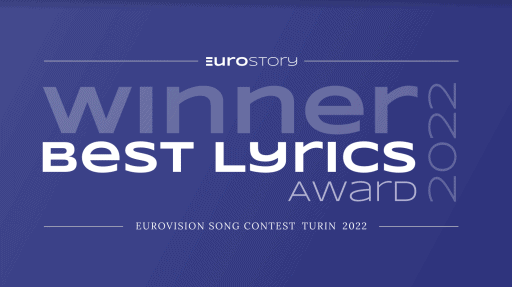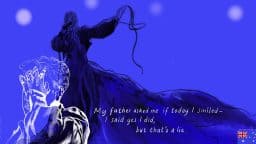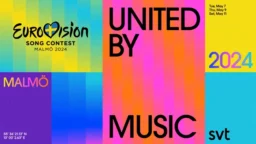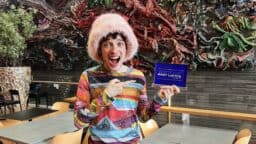For the sixth time Eurostory presents the Best Lyrics Award, an award for the best song lyrics from this year’s Eurovision songs.
Past winners are:
The six nominees for 2022 are now known. As in previous years the winner will be chosen by a large international expert jury, and also by you, visitors of our website! [update: by now the voting window has closed. The winner will be announced in the last week before the Eurovision final.]
Growing phenomenon
The Eurostory Best Lyrics Award is a growing phenomenon in the Eurovision world. In 2021, only days before winning the Eurovision Song Contest, the Italian band Måneskin received the Eurostory Best Lyrics Award for their song Zitti e buoni. ‘For the first time in my life I receive an award for my lyrics. I will never forget this,’ singer and lyricist Damiano David told us while holding the trophy.
Professional jury
Beside the public vote there’s also an expert jury, which consists of international writers, journalists, publishers and past contestants – people who work with written texts and lyrics professionally. They’ll cast their vote over the coming weeks, and during the Eurovision week in Turin we will announce the winner of the Eurostory Best Lyrics Award 2022.
The nominees
These are the nominees for the Eurostory Best Lyrics Award 2022, in random order:
- Switzerland – Boys do cry (Marius Bear, lyricist: Marius Bear & Martin Gallop)
- Serbia – In corpore sano (Konstrakta, lyricist: Ana Đurić)
- Ukraine – Stefania (Kalush Orchestra, lyricists: Ivan Klymenko & Oleh Psiuk)
- United Kingdom – SPACE MAN (Sam Ryder, lyricists: Sam Ryder, Amy Wadge & Max Wolfgang)
- Italy – Brividi (Mahmood & BLANCO, lyricists: Alessandro Mahmoud & Riccardo Fabbriconi)
- Australia – Not the same (Sheldon Riley, lyricist: Sheldon Riley Hernandez).
Read the jury reports below.
Switzerland – Boys do cry (Marius Bear, lyricist: Marius Bear & Martin Gallop)
Jury report
Slowly but carefully Marius Bear directs us into his song and his story. The lyrics start by giving us a setting: ‘In my room.’ He adds a character: ‘Lives a boy.’ And then provides more information about him: ‘Who could be blue.’ Those are key words, the ‘could be’, and they point out that we shouldn’t jump to rusty old conclusions. Not all boys put a brave face on or ‘man up’ – boys cry, too.
What’s so wonderful is that this statement is accompanied by a taking down of other certainties: mountains can crumble, planes can fall out of the sky. And there’s extra points for using the beautiful word ‘cavalier’.
Click here for more information.
Serbia – In corpore sano (Konstrakta, lyricist: Ana Đurić)
Jury report
The opening line for In corpore sano might just be the most remarkable opening line of all Eurovision songs throughout history: ‘What could be the secret of Megan Markle’s healthy hair?’ After an exposition on hydration and bags under your eyes, we have lines on… the spleen. A body part that is also never before mentioned in a Eurovision competition. The rest of the lyrics are pretty bizarre, but not incoherent: they do actually build towards an argumentation that touches upon the impossible beauty standards and health requirements set for public figures. Ending with an almost despairing: ‘What do we do now?’
Click here for more information.
Ukraine – Stefania (Kalush Orchestra, lyricist: Ivan Klymenko & Oleh Psiuk)
Jury report
Stefania has become a song that expresses the pain of the horrendous war in Ukraine, albeit through a different route: it simply describes the love for all our mothers. Underneath that declaration of love sits an indictment against the destruction of that which is most important: one’s family, roots, home and country. The members of Kalush Orchestra couldn’t have known at the time what added meaning their song would gain, but a line such as ‘Розквітає поле, а вона сивіє’ (‘The fields are blossoming, but her hair is turning gray’) now sounds like a painful metaphor. Even the one who is dearest to you – your mother – is getting older. But the song also promises: ‘My love for you has no end.’
Click here for more information.
United Kingdom – SPACE MAN (Sam Ryder, lyricists: Sam Ryder, Amy Wadge & Max Wolfgang)
Jury report
Did you think this song was about an astronaut? Sorry, but you’re wrong. Although it does make sense, because the lyricists have sort of tricked us by putting a inaudible comma between the two title words. So what they’re actually singing is ‘I’m up in space, man!’ and ‘Nothing but space, man!’ That special use of commas has turned SPACE MAN into one of the most humouristic songs for this year. That doesn’t mean it shies away from sadness completely; the first person narrator imagines himself in space because he believes that to be the one place where his broken heart won’t trouble him anymore. Unfortunately, it doesn’t pan out: ‘gravity keeps pulling me down as long as you’re on the ground’. In the final line the narrator chooses his real destination (‘I wanna go home’), a great way to end a nice tragicomical text.
Click here for more information.
Italy – Brividi (Mahmood & BLANCO, lyricists: Alessandro Mahmoud & Riccardo Fabbriconi)
Jury report
With Brividi Mahmood and BLANCO have created a truly universal tale. Regardless of one’s gender or sexuality, we’ve all had the experience that our high expectations of a love started to crack and crumble. The first line sparkles: ‘I dreamt of flying on a diamond bicycle with you.’ This metaphor is so new and at the same time so striking that it hovers in the air throughout the song. And just as the diamond bicycle represents happiness, so the first words of the refrain ‘nudo con brividi’ – naked with shivers – paint a brilliant picture of that feeling you get when you feel that something is wrong. The makers continue to deliver one fantastic image after the other throughout the song, and even manage to hide an important plot twist at the very end – ‘uno fra tanti’ – one of many.
Click here for more information.
Australia – Not the same (Sheldon Riley, lyricist: Sheldon Riley Hernandez).
Jury report
Riley’s poignant lyrics convey the ongoing experience that he has had – as a child diagnosed with Asperger’s syndrome – with being different: ‘I’m not the same’. Instead of using words that merely describe his feelings (such as ‘sad’ or ‘angry’) he serves us glimpses of what it was like, strengthening his testimony. A strong example of this is the line in which his father asks him whether he’s laughed at all that day. Another powerful note is the beautiful discovery with which Riley turns the song around halfway: ‘So you go and leave the pain and find another way to make yourself another game, maybe one for all to play, cause it’s not just me who’s not the same – we’re not the same’.
Click here for more information.
Voting starts now!
The winner will be chosen by an international expert jury (75%), and also by you, visitors of our website (25%)! In the poll at the top of this page you can vote for your favourite lyrics. During the Eurovision week in Turin we’ll announce the winner of the Eurostory Best Lyrics Award 2022!

The jury reports were translated by Sandra C. Hessels.






